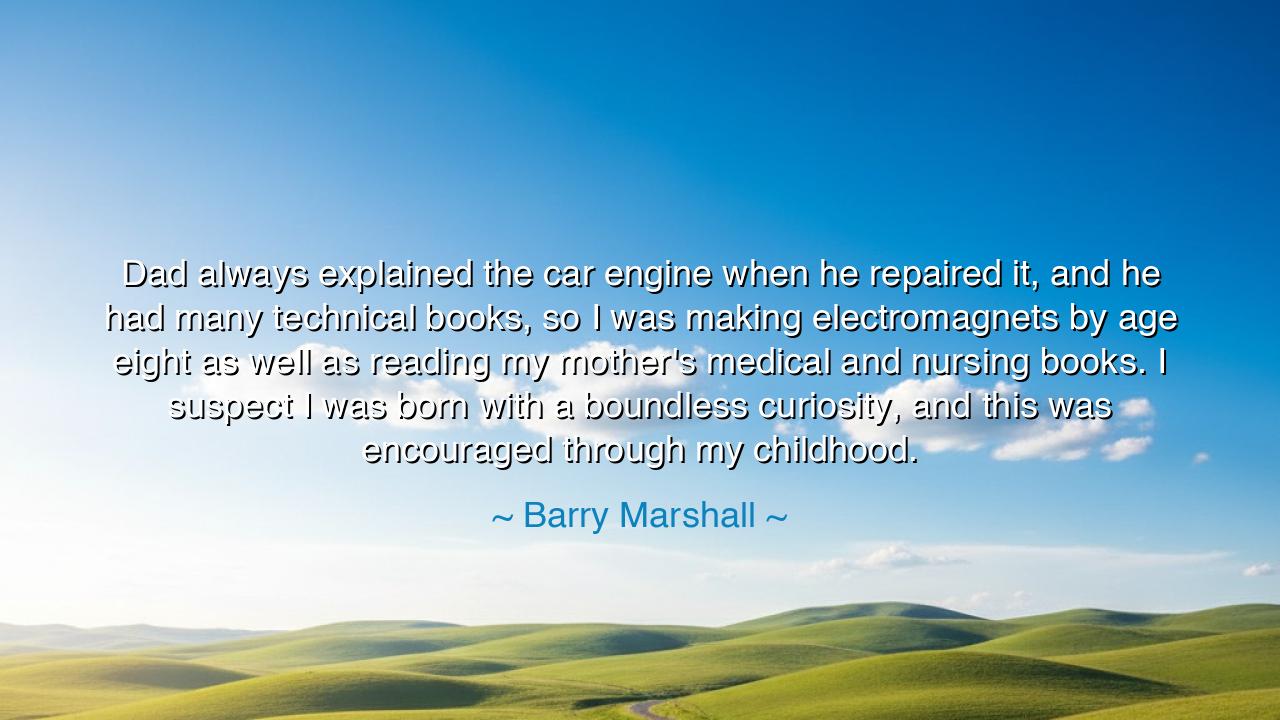
Dad always explained the car engine when he repaired it, and he
Dad always explained the car engine when he repaired it, and he had many technical books, so I was making electromagnets by age eight as well as reading my mother's medical and nursing books. I suspect I was born with a boundless curiosity, and this was encouraged through my childhood.






"Dad always explained the car engine when he repaired it, and he had many technical books, so I was making electromagnets by age eight as well as reading my mother’s medical and nursing books. I suspect I was born with a boundless curiosity, and this was encouraged through my childhood." With these words, Barry Marshall speaks not only to his own journey of intellectual exploration, but to the timeless and sacred role that curiosity plays in human development. From an early age, Marshall was surrounded by a nurturing environment that both recognized and encouraged his innate desire to understand the world. His father, through his technical explanations, and his mother, through her medical knowledge, imbued him with a deep respect for both the mechanical and the biological worlds, creating a foundation for the groundbreaking work he would later achieve in medicine.
In the ancient world, there were those who understood the transformative power of curiosity and knowledge. Consider the story of Leonardo da Vinci, the quintessential Renaissance man whose curiosity was insatiable and whose interests spanned everything from anatomy to mechanics. Da Vinci’s notebooks are filled with detailed drawings of both human bodies and machines, demonstrating that to understand one’s environment is to seek mastery over it. In his relentless pursuit of knowledge, da Vinci embodied the belief that curiosity is not merely a passive desire, but a vital force that drives creation and discovery. Like Marshall, da Vinci’s upbringing and the freedom to explore his curiosity led to great innovation in both the arts and sciences.
Marshall’s early interest in electromagnets and his immersion in his mother’s medical books speak to a childhood enriched with learning. It is said that the foundation for greatness is often laid in youth, when the mind is like a sponge, ready to absorb new ideas and concepts. This was true in the lives of many ancient sages, who often started their journeys of discovery early. The young Socrates, for instance, was said to have spent hours questioning his elders and seeking to understand the principles of virtue and knowledge. The elders, recognizing the potential of his questioning mind, encouraged him to continue seeking, even when his inquiries challenged the norms of society. In this way, curiosity became a path to wisdom, as it always has been throughout history.
But Marshall’s quote also highlights something equally profound: the influence of his parents on his intellectual development. His father’s technical explanations and his mother’s medical knowledge were not simply facts imparted to him; they were models of engagement with the world. Curiosity is not merely a passive force; it is often nurtured through the example of others, especially those who are close to us. Marshall’s parents did not just teach him—through their work, they showed him how to question, how to engage with the world in a way that saw every object and idea as something worth exploring. This active encouragement of curiosity is the true gift of any teacher, parent, or mentor: the ability to inspire the next generation to ask not just "what is" but "why" and "how."
The story of Marshall's early life is a modern echo of the wisdom passed down through the ages—that the pursuit of knowledge is a sacred duty and a path to personal and collective enlightenment. The ancient philosopher Aristotle believed that humans were, by nature, curious creatures, and that it was through inquiry and study that one could achieve both truth and virtue. The pursuit of knowledge was not just for practical use, but for the betterment of the soul. Marshall’s own development as a young boy surrounded by scientific books and the encouragement of his family mirrors this ancient truth. The desire to know, to understand, and to make sense of the world is both a practical and spiritual endeavor.
From Marshall’s story, we learn that curiosity, when nurtured, can lead to profound achievements. His curiosity about the mechanics of engines and the mysteries of medicine did not stop with mere curiosity—it propelled him to become a key figure in the discovery of the Helicobacter pylori bacteria's role in stomach ulcers, a breakthrough that would change the course of medical science. This is a lesson for us all: that curiosity—when paired with dedication and nurturing—can lead not only to personal fulfillment but to advancements that benefit humanity.
The lesson here is not simply about becoming great in one’s field, as Marshall did, but about recognizing the transformative power of curiosity in all areas of life. Curiosity is the driving force behind all human progress, and it is not confined to those who become famous or celebrated. Every person, regardless of their field or station in life, has the potential to create, to discover, and to change the world—if only they remain curious. Let us take this lesson into our own lives: to nurture our curiosity, to question freely, and to encourage the curiosity of others. In doing so, we honor the legacy of those like Barry Marshall, whose curiosity led to discoveries that would change the world. Let us make room for the boundless curiosity that resides in us all, and in doing so, unlock the possibilities that lie beyond what we know.






AAdministratorAdministrator
Welcome, honored guests. Please leave a comment, we will respond soon